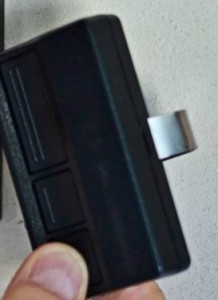Neighborhood Garage Door Service of Denver, Colorado is aware of many forms of garage door hacks. It might be a point of vulnerability in your home that you’ve never considered before. If a criminal was able to remotely open your garage door, they might have full access to your home.
Understanding Hacking
Thanks to movies and tv, we have a poor understanding of what “hacking” really refers to. Some think that posting something silly to someone’s Facebook if they leave their phone lying around is hacking. Others picture the stereotypical underground teenager with a snarky attitude and a dusting of Dorito residue on their fingers.
Basically, hacking refers to modifying something for some unintended use. This can be as simple as the dad who uses a shop vac to give his daughter the perfect ponytail, or as complicated as creating software to break through security and access your bank account. In the case of your garage door, the weak point is the remote opener. Since it is based on radio frequencies, it can be hacked.
A Brief History of Garage Door Technology
Electric garage door openers have been around for almost 100 years. They’ve undergone many upgrades over the years, including the area of security. The original versions used a simple push-button opener in the driveway that a driver could easily access. As you can imagine, this was highly insecure.
Fueled by steps forward in communication technology, radio frequency based remote openers were the next innovation. The original remotes did not increase security as much as convenience. Anyone with a garage door opener could open any door because they all used a basic code on one frequency.
Continuing to supply better security, overhead door companies created a dipswitch method of programming remotes. This method used a set of 12 up or down switches. The switches would be set identically on the remote and the opener. With almost 4,100 possible combinations, it would be almost impossible for a hacker to try to find the right combination manually.
This brings us to the current situation. Hackers can use computers to perform a “brute force” attack, trying every combination. Modern computers can run through all 4,096 possible codes in just seconds. This makes any door still relying on this dipswitch technology virtually wide open.
King of the Garage Door Hacks
Samy Kamkar is a white-hat hacker. As a security expert, he uses his abilities to hack into security systems as a way to help companies improve their security. He turned his attention to what he saw as a highly vulnerable entry point to homes. With some basic modifications, he was able to modify a device to brute force attack his own garage door opener. Perhaps to point out the absurd ease of this hack, he used a pink toy phone made by Mattel.
Samy’s first design, which added a simple antenna to the toy, was able to try every possible combination in around 30 minutes. After playing around with it he was able to modify his software allowing it to rule out certain guesses. This brought the time down to under one minute!
Samy released his design to the public in order to put pressure on garage door manufacturers to increase security. It worked, and companies developed a new system.
Latest protocol – Rolling Codes
Rather than having each remote and opener pairing rely on one fixed code, manufacturers introduced a rolling code system. This system works by changing the code after every use of the remote. This severely limits the brute force method by making the software start over after every attempt.
Not to be outdone, Samy has since hacked this method as well. Using a brilliant combination of radio jammers and a brute force attack, he was able to perform a garage door hack on the new openers as well. Interestingly, he discovered this could also be used to hack remote entry fobs for cars as well. This pushed manufacturers to create another new system that makes the codes expire quicker.
What Can You Do to Prevent Garage Door Hacks?
One very low-tech security measure you can take to secure your home against garage door hacks may seem like an obvious step. Lock the door from your garage to your home. Doing so will limit overall access to your home.
To help prevent a hacker from gaining access to your garage in the first place, make sure your garage door is using the latest security technology. A quick way to check this is to carefully open your remote. If you see a set of dipswitches, your door is definitely using a fixed code system and should be updated. You can also check your owner’s manual, or do a quick search online for your model number. Make sure your door is using current rolling code protocols.
If you discover that your garage door opener is out of date, consider replacing it. When you’re ready to upgrade your security, contact us at Neighborhood Garage Door Service of Denver, Colorado. We’ll be glad to help you select the right opener for your needs. Call today!









